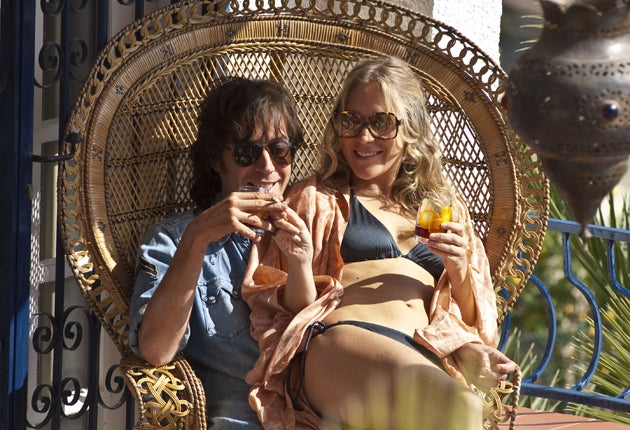Mr Nice, Bernard Rose, 121 mins (18)
You would have to indulge in Howard Marks's premium brand not to find this flat biopic, starring an irritating Ifan Rhys, smug and self-congratulatory

What's the very least you can expect a biopic to do?
Tell you who a person was, what they did and, surely, persuade you that they merited a film in the first place. In some cases, persuasion seems almost beside the point: you can't imagine many people paying to see Bernard Rose's Mr Nice if they weren't already fans of its subject, former drug smuggler Howard Marks. Now, there are possibly enough fervent Marks-ists out there already to make Mr Nice a viable financial proposition – his 1996 memoir of the same title apparently still shifts 500 copies a week. But for the non-aligned, writer-director Rose doesn't make that much of a case for his man, other than to tell us that he's an affable chap who likes the odd spliff, never meant anyone any harm, and had a jolly old time sticking it to the Man in the nicest possible way.
That's hardly enough to merit two hours' screen time – or a portentous Philip Glass score – especially when the story is told, altogether unquestioningly, from Marks's point of view. The film begins with red curtains and Marks (Rhys Ifans) ambling on stage to regale a theatre audience with his tale – a hoary framing device, excused by the fact that Marks has latterly made a career as a raconteur. Not surprisingly, the film ends with its hero lighting a joint to wild cheers from his public. His narrative is no searing confessional, more a cosy fireside reminiscence, like a bluff brigadier mumbling away over the port.
There's surely a good story in Marks's life, but Rose's narrative is patchwork picaresque, one rum thing after another. Working-class Welsh lad goes to Oxford in the 1960s, meets the arty types down the corridor, wonders what the funny smell is coming from their room and learns that dope and the occasional sugar lump go down a treat with dayglo posters and a cavorting dollybird or two. Later he falls into drug smuggling by accident and meets some far-out types along the way. Ifans's endlessly amused voice-over, rolling lushly like a red leb Dylan Thomas, jovially cuts in now and then as Marks tells us about the IRA man (David Thewlis) with a thing about animal porn, the time he tried to smuggle a consignment into the United States in a rock band's speaker cabinets, the fake Mexican policeman that he produced as a court witness ... I say, do belt up and pass that joint, Brigadier.
The film fulfils the minimum life-story requirements: it gives you the basic facts, shows that the subject was a little bit representative of his time, tosses in a few gentle ironies. Beyond that, Mr Nice is as flat as a slept-on roach. It could have been richer had it distanced itself from Marks's account, played up the inconsistencies, perhaps ironised him in the way that 24 Hour Party People fondly ridiculed Tony Wilson. But there's no critical perspective, and the old "ain't-I-a-one" voice-over keeps kicking: "I was now being pursued by the IRA, the DEA, Customs and Excise and the press."
There are a few cheerful, if obvious screw-the-system gags: shagging in front of Nancy Reagan's "Just Say No" TV broadcast, money men boggle-eyed at Marks piling money on their boardroom table ("Gentlemen – this is what banking is all about!"). And there are enjoyable turns from a suave Omid Djalili, as Marks's Pakistan contact, and Thewlis, who hasn't had the chance to really go spare on screen since Naked, and more than makes up for lost time as shaggy, mad-eyed Jim McCann. There's also some wasted casting, notably Crispin Glover, his loopiness swamped by beard, and an uneasily transatlantic, oddly tetchy Chloë Sevigny as Marks's wife Judy.
But the real stumbling block is Rhys Ifans. He can be a good thing when judiciously placed in the right film (Greenberg, Enduring Love). Left off the leash, however, he exudes smugness in a way that ought to be appropriate to Marks's stoner swagger, but quickly gets insufferable, especially in all the shots of him with fumes billowing from his smirking gob.
"A dealer," Marks says, "is really someone who buys more dope than he can smoke." Not strictly true – a dealer is someone who hopes to sell more than he can smoke, for the best possible profit. Marks is your basic hippie capitalist – and for all his vaunted good-guy principles, one who didn't have qualms about playing ball with both MI6 and an IRA boss. The film has little to say about this, nor – outside a morose final chapter – about Marks putting himself in a position where, any day soon, his wife and daughters were likely to see him stuck behind bars. So Marks put a lot of dope on the market at a time when it was much appreciated – this hardly makes him a pioneer of counter-culture, any more than the bloke who sold Picasso his brushes was the founding father of Cubism. Mr Nice is nothing more than – excuse the expression – a glorified puff piece.
Next Week:
Jonathan Romney heads deeper into Biopic Valley, with the story of the boy who created Facebook, David Fincher's The Social Network
Join our commenting forum
Join thought-provoking conversations, follow other Independent readers and see their replies
Comments
Bookmark popover
Removed from bookmarks